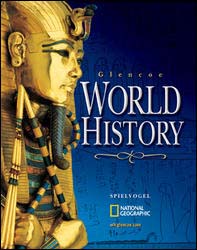Glencoe World HistoryChapter 4:
Ancient Greece, 1900–133 B.C.Chapter OverviewsEarly Greek civilization consisted of many small, independent city-states. Trade led to Greek colonies, and Greek civilization gradually spread throughout the Mediterranean world. Countless works of art, architecture, philosophy, drama, and literature were created, and a direct democracy thrived. Macedonian Alexander the Great built an empire and spread Greek culture to Southwest Asia. Section 1 The First Greek Civilizations
The Minoan civilization flourished on Crete as early as 2800 B.C. Most historians believe it was destroyed by the Mycenaeans from the Greek mainland. The Mycenaean civilization consisted of powerful monarchies that flourished between 1600 and 1100 B.C. After the collapse of this civilization, Greece entered a period known as the Dark Age. Food production decreased, and the population declined. At the same time, Greeks sailed extensively on the Aegean Sea and settled on islands and in Asia Minor. Iron replaced bronze in the making of tools and weapons. During the eighth century, the Greeks adopted the Phoenician alphabet, and Homer wrote his famous epic poems, the Iliad and the Odyssey. Section 2 The Greek City-States
Independent city-states became the focus of Greek life. Trade and the search for new farmland led to colonies throughout the western Mediterranean. Trade also produced a new group of wealthy individuals who resented the power of the aristocrats. The new rich, along with many peasants, supported the rise of tyrants who seized power from the aristocrats. When the rule of tyrants declined, some city-states became oligarchies. In Sparta, a military state, a small group of men decided what issues to place before adult male voters. In Athens, aristocratic rule dissolved into political strife between peasants and aristocrats. Leadership shifted between reform-minded aristocrats and tyrants, until land reform and an assembly served as the foundations of Athenian democracy. Section 3 Classical Greece
As the Greeks spread throughout the Mediterranean, they came into conflict with the Persians. Although Athens itself was partly destroyed in a war, Greece emerged victorious, and Athens became the center of power of a Greek empire. Pericles was the dominant figure in Athens and undertook the rebuilding of the city. During the Age of Pericles, the Greek empire expanded. At home, a direct democracy flourished, in which all adult male citizens could vote. A woman's primary role was to be a good wife, mother, and manager of the household. Distrust between Athens and Sparta led to the Great Peloponnesian War. After Athens was badly defeated, Sparta, Athens, and Thebes struggled to dominate Greek affairs. Section 4 The Culture of Classical Greece
Religion was central to daily life in Greece. The Greek religion focused on performing rituals to gain the favor of the Greek gods. To learn the will of the gods, Greeks made use of oracles. Greek drama developed during this period. Classical Greek philosophers, such as Socrates, Plato, and Aristotle, devoted themselves to rational thought as a means of understanding the nature of the universe. Aristotle also created the foundations of Western science. Historians such as Herodotus and Thucydides originated the writing of history in Western civilization with their lengthy works on the Persian and Peloponnesian wars. Classical Greek art, which sought to express eternal ideals, is reflected in temples and sculptures. Section 5 Alexander and the Hellenistic Kingdoms
In 359 B.C. Philip II came to the throne in powerful Macedonia. He longed to unite Greece and Macedonia. Fearful of Philip's intentions, the Greeks formed a defensive alliance, but they were defeated. Philip's son Alexander, who became known as Alexander the Great, within a few years defeated the Persian Empire and expanded his empire as far east as modern Pakistan. Although Alexander's empire was short-lived, it was successful in spreading Greek culture in the region. During the Hellenistic Era, Greek colonies thrived in Southwest Asia, and important works of science, philosophy, art, and architecture were produced throughout the Hellenistic world.  | 

















